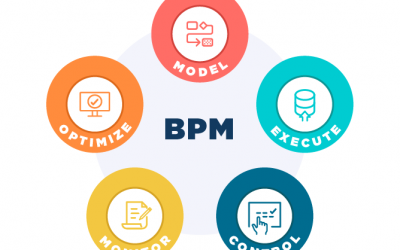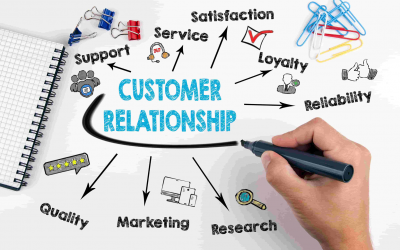The COVID-19 crisis is unquestionably having an unprecedented impact on the global economy. Businesses are closed, customers are forced into lock-down, supply chains are disrupted, and employees are being laid-off or put into ‘technical unemployment’ on a massive scale. It is arguably one of the most, if not the most, severe public health and economic crises since WWII.
Despite the immense impact, there are always opportunities to be found in times of crisis. As Andy Grove, former Intel CEO, noted, “Bad companies are destroyed by crisis. Good companies survive them. Great companies are improved by them.” With that in mind, we asked three experienced leaders in the field of Business Strategy, ICT and Marketing what opportunities can be found in this crisis and how to come out of it a stronger, more resilient, and successful business. We’ve combined and summarized their insights in this article to help you make the most of this time in quarantine.
1. Leverage the time and staff availability
If managed correctly, one core opportunity in this crisis is making use of the newly available time and staff availability. According to Anthony Stabourlos, a leading Digital Strategy and Innovation Consultant, “this is the perfect time for companies to try something different. Most businesses are slowing down or being completely [temporarily] shut down, meaning that they now have “time” to do other things, optimize, etc.” Indeed, and similarly, Jan Lagast, a prominent Vision Architect and Management Advisor suggests that now is a great opportunity to “use the available time to rethink the business together with staff and in communication with Clients.”
All businesses employ smart, motivated, ambitious people with a wealth of experience and knowledge (we suppose that’s why you hired them in the first place). This significant resource has not disappeared, but is now more available to help you think and enhance internal business processes. Reallocating these resources to help redefine the business is a remarkable opportunity that can help you get out of this stronger.
The market will attempt to go back to where it was before this crisis period. A lot of companies will fail in this pursuit, because some competitors have taken their “time” to think about and implement new ways of working.
As they say, when the economy is booming there is money to invest, but there is no time “to sharpen the saw”, but when it’s crisis there is plenty of time but no willingness to invest money. Anthony reflects that “the market will attempt to go back to where it was before this crisis period. A lot of companies will fail in this pursuit, because some competitors have taken their “time” to think about and implement new ways of working.” Don’t make the mistake of not investing now that there is time.
2. Focus on post-crisis strategies and client value
Without doubt, this crisis will have a long-lasting effect on the market even after its ‘all over’. How exactly the market and the consumer will change is yet to be determined, however it’s important to get ahead and start thinking about your business post-crisis. Adrien Willems, an experienced Entrepreneur and ICT Strategy Consultant, advises that now is a good time to gather your team (online or respecting social distancing of course) and “review your business model in order to adapt to the new environment after the crisis. Make a list of competences and skills needed for that new business model. Review the customer base and contact some of them to ask what added value you can bring them in the near future.” The key here is to focus on post-crisis strategies and really drilling down on client value delivery (Jan Lagast).
The survivors will be the ones that are now focusing on what the future market will look like, and how they will be able to create client value and use the right digital tools to do so.
Understanding your clients and their needs has always been important. However, understanding them now, especially what they are post-crisis, is more important than ever. As such, alongside thinking about your new business model and strategies, determine whether your existing business setup and digital systems provide you with sufficient insight into your clients’ needs and wants. If not, now would be a good time to review how, and through which means, you collect and manage customer feedback on your product or service.
3. Focus on digitalization and business process automation
Another significant opportunity is to focus on enhancing your digital business capabilities. Even without the crisis, most companies have not discovered the maximum potential of digital tools and the real ‘digital transformation (Anthony Stabourlos). Post-crisis, the drop in demand and consumer confidence will have ‘reset’ the market and will create a ‘new playing field’. Taking the time now to invest and implement robust digital business capabilities, particularly in terms of sales and marketing, can help you out-perform and out-sell the competition.
When a business does not have a well-structured digital platform to run their business, including up to date tools for security, CRM, Collaboration, HR, ERP, production, collecting business data, … then they are very vulnerable for cyber-attacks, losing crucial company data, losing communication, losing employees, losing customers, losing suppliers, and losing their reputation.
Thus, whilst digitalization is opportunity that can be leveraged now and after the crisis in a new playing field, it also simply helps you run a good business and manage your risks.
The term “digitalization” is often associated with complex, expensive and large-scale internal projects. However, these days there are a plethora of new software platforms including Creatio, that provide ‘low-code / no-code’ tools where various business processes can be automated in a very intuitive and user-friendly fashion without needing significant technical knowledge. As these tools become easier and more flexible to use, not digitalizing your business augments the risks that you lose out to competitors that have adopted more efficient ways of working. Take the time now to evaluate the digital gaps in your company and explore new tools available on the market.
About us
Flexentric is a boutique digital business solutions provider based in Antwerp. We create tailor-made solutions based on Creatio low-code CRM platform for Sales, Marketing and Service. We always look for opportunities and can help you do so too.




